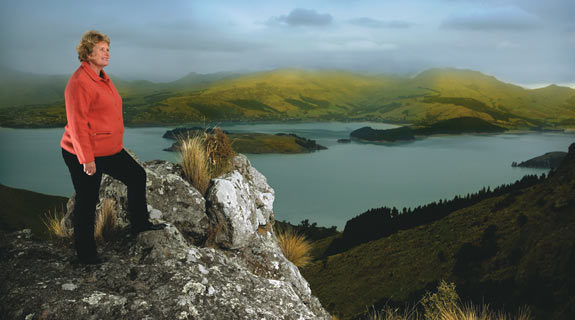Take the world’s most reliable, constant and universal waste product, and use it to fuel cars, planes and homes. Sound far-fetched? Vicki Buck, ex-mayor of Christchurch, is doing just that
She took on local politics, the education system and now Vicki Buck is emerging as an international eco-hero. Recently named as one of 50 people who could save the planet, this ex-Christchurch mayor may revolutionise global transport. Denis Welch meets the biofuel pioneer extracting green goo from Blenheim’s poo.
Photo: David Baird
Barely a year ago, biofuels were being hailed as the Next Big Thing in clean, green energy. Now they’re getting seriously bad press. The carbon footprint of biofuel production from crops like corn, maize and rapeseed turns out to be even bigger than that of the fossil fuels they’re intended to replace. Serious food shortages and price hikes have been blamed on the rising demand for food crops as biofuel.
The solution, if solution there is, may lie in the bowels and bladders of the good people of Blenheim, whose body waste currently winds up in sewage oxidization ponds where, converted into waste water, it flows through outfalls into rivers and the sea.
In that water, however, are squadrillions of algae, and from those algae an enterprising company called Aquaflow Bionomic Corporation aims to make biofuel that will help power anything from jet planes to cars. And this biofuel—unlike, say, the ethanol derived from corn—doesn’t take vast tracts of land out of food production.
Vicki Buck had never seen an alga in her life till she helped set up Aquaflow Bionomic, but the former mayor of Christchurch has become quite passionate about the little critters.
“Aquaflow Bionomic Corporation aims to make biofuel that will help power anything from jet planes to cars. And this biofuel—unlike, say, the ethanol derived from corn—doesn’t take vast tracts of land out of food production”
“I knew nothing about algae three years ago and I’ve come to love them!” she exclaims. “They’re in clouds, I’ve discovered—they’re everywhere, they’re totally ubiquitous, and they’re very social.”
I almost expect to see a pet alga run up and rub itself against Buck’s legs, as we sit in the sunshine outside her Christchurch house, but alas, they’re invisible to the naked eye. To the clothed eye, Buck assures me, “They’re incredibly beautiful—and they predate us by millions of years”.
So, these extremely old (but very social) microscopic organisms are going to put the gas back in our tanks in a clean, green, non-carboniferous way?
Sure will, if Aquaflow Bionomic has its way. On the verge of commercial-scale biocrude production, it already employs 18 staff (and 6,000 species of algae) at its Nelson headquarters, including biochemists and aquaculturists; and the process by which the fuel is extracted from the algae is ecologically friendly every step of the way.
“We collect the algae,” explains Buck, “having learnt many ways not to do it, and you end up with two products—algae and water.”
“The process of extracting the algae, which looks like slightly greenish water, is the first step in cleaning the water as well, because the algae have eaten a whole pile of crap: they’ve got nasties in them. Our theory is that we should be able to take that on a couple more steps and make that water drinkable again. So you end up with a fuel source—and clean water.”
Aquaflow Bionomic grew out of an earlier attempt to convert wood into biofuel, but that venture faltered. “The lignin in the wood was too much of an obstacle,” says Buck, “so we went down to the Metro café and had a bottle of wine and thought, ‘There’s got to be a better way than this!’”
“Boeing representatives have already been to see Aquaflow Bionomic. The idea of fuelling their planes with algae-based biofuel was a long way down their agenda, says Buck, ‘until they came and visited us.’ ”
“We” being Buck, Picton entrepreneur Nick Gerritsen and Barrie Leay, better known in former incarnations as executive director of the Electricity Supply Association and director-general of the National Party.
Generation Green
Algae’s potential as an energy source has long been recognised, but the science focused on separating out about 20 particularly oil-rich types. That process proved very expensive, so Aquaflow Bionomic took their cue from Ernest Rutherford (“We didn’t have much money, so we had to think”) and tried a different approach.
“We’ve taken a completely contrarian view,” says Buck. “We don’t want to isolate [the oil-rich algae]. We can’t afford to. We think it’s dumb. So we’ll work with what we’re given and make it easier and cheaper.”
Once parted from the water, the algae “looks really disgusting,” according to Buck. “It’s green, slimy sort of stuff.” Actually, she says, like the born-again algaphile she truly has become, “As you watch it come out, as it plops off the machine, it’s incredibly beautiful. Well, I thought it was beautiful.”
How the slimy stuff then morphs into fuel is of course a commercial secret, but basically it involves extracting lipid-rich oils from the pulp and refining them. There has already been one successful public test: in December 2006 David Parker, the Minister Responsible for Climate Change Issues, drove a Land Rover around Parliament’s forecourt with some unleaded algae in the tank and Green Party co-leader Jeanette Fitzsimons as a passenger.
Let’s not get carried away, but one day that drive might come to seem as historic as the Wright brothers’ first flight or the day Rutherford accidentally dropped an atom on the lab floor and split it.
Whatever the new fuel is called—Superslime? Sewage Plus?—Aquaflow Bionomic aims to have it on the market by the end of this year. Interest has been expressed by American venture-capital companies looking for this kind of investment abroad, particularly in the light of ethanol’s waning star.
With the algae, Buck emphasizes again, “You’re taking something that’s a waste product, basically, and turning it into something useful. You’re not competing for resources with everybody else, you’re not making people in the developing world starve because there’s no corn or maize left in the world because it’s all gone to fuel SUVs.”
Corn-based ethanol is now referred to as a first-generation biofuel: “We’re second-generation or next-generation,” says Buck. “I’m not sure how many generations there are: we’re generation Z—whatever the current one is!”
The Parliamentary Commissioner for the Environment, Jan Wright, has already warned MPs that New Zealand would be wiser to wait for second-generation biofuels to come on the market before enforcing their use at the pump, given the environmental costs of the first-generation fuels.
But can we be sure that extracting the algae won’t screw up the food chain in some as-yet-unforeseen way—ten years down the track, will people be smiting their brows and crying, “Didn’t those fools back in 2008 realise they’d be wrecking a fragile ecosystem?”
“No,” says Buck with a happy air of certitude. “We shouldn’t be putting that [waste water] back in the ocean. Definitely not. It’s quite nasty. It’s not helping.”
And we’re not destroying something else in order to get at these incredibly helpful algae? “No, I can’t honestly think that we are.”
Flying High
If the product does become a viable commodity, then, wholly unsubsidised, it will have to compete on world markets against massively subsidised US crop-based biofuels. But such is its appeal that Boeing representatives have already been to see Aquaflow Bionomic. The idea of fuelling their planes with algae-based biofuel was a long way down their agenda, says Buck, “until they came and visited us”.
With the demand for aviation fuel expected to double in the next ten years, other airlines are looking to biofuels too. Air New Zealand is planning a test flight, possibly with biodiesel from Aquaflow Bionomic, who recently appointed an aviation engineer as a consultant.
So it’s all go with the algae, and for Buck personally. Earlier this year—to her immense surprise—she found herself nominated by British newspaper the Guardian as one of 50 global green heroes: the people most able to stop destruction to our world. She can live with that, but to call her the “acceptable face of biofuels,” as the Guardian did, is to invite hoots of self-mocking laughter.
“Definitely not me! I’m not the acceptable face of anything! If I am, the world’s in deep trouble!”
She’s gone pretty green, though, having had her consciousness raised over the past few years, and feels “some sort of imperative to do something about it”.
And, she adds, there’s a joy in doing it through business as well. True, she’s frustrated by the green tape involved in seeking help from government agencies like the Energy Efficiency & Conservation Authority, and would like to see more governmental urgency on climate-change issues, but she applauds the commitment to a carbon emissions trading scheme and, ultimately, carbon-neutrality.
“If you can see what’s happening,” she says, “it’s pretty hard to go back. What would be really important about making a product and just selling more of it onto the market so that we consume more stuff? It’s really hard to get your head around that now.
“As you become more aware of what climate change is doing and is going to do, then you can’t go back.”
Denis Welch is a Wellington writer







